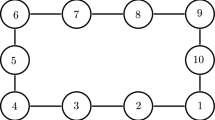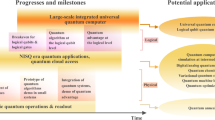Summary
TheDistributed Consensus problem involvesn processors each of which holds an initial binary vlaue. At mostt of the processors may be faulty and ignore any protocol (even behaving maliciously), yet it is required that the non-faulty processors eventually agree on a value that was initially held by one of them. In this paper we focus on consensus in networks whose degree is bounded, following the work of Dwork, Peleg, Pippenger and Upfal [8]. In such a context, complete consensus among all the correct processors is not possible and some exceptions must be allowed. We first show how to achieve consensus in the butterfly network usingO(t+lognloglogn) one-bit parallel transmission steps, while tolerating the asymptotically optimal number of faulty processors (O(n/logn)) and having the asymptotically minimal number of exceptions (O(tlogt)). This result considerably improves on the running time of existing butterfly consensus protocols [2, 8]. In particular, it replaces the running time ofO(nlognloglogn) of [2] with an asymptotically optimal one. As in [8], we can then decrease the number of exceptions toO(t) by using additional links, while maintaining the same running time. The protocol is derived from a consensus protocol for completely connected networks that is interesting in its own right: it achieves Distributed Consensus with optimal number of processors, asymptotically optimal total bit transfer and nearly optimal number of rounds.
Similar content being viewed by others
References
Bollobás B: Random Graphs. Combinatorics. London Math Society LN52, Cambridge University Press. London 1981, pp 80–102
Berman P, Garay J: Asymptotically optimal distributed consensus. Proc 16th Int Colloquium on Automata, Languages and Programming. Lecture Notes Comput Sci, vol 372. Springer, Berlin Heidelberg New York 1989, pp:80–94
Berman P, Garay J, Perry K: Towards Optimal Distributed Consensus. Proc 30th Symp on Foundations of Computer Science, October 1989. IEEE Computer Society Press, Los Alamitos, pp 410–415
Berman P, Garay J, Perry K: Recursive phase king protocols for distributed consensus. Penn State University Tech Rep CS-89-24, August 1989. Revised version: Bit optimal distributed consensus. In: Manber U, Yaeza-Bates R (eds) COMPUTER SCIENCE, Research and Applications. Plenum Press, New York 1992
Cristian F, Aghili H, Strong R, Dolev D: Atomic broadcast: from simple message diffusion to Byzantine agreement. Proc 15th Int Symp on Fault-Tolerant Computing, June 1985. IEEE Computer Society Press, Los Alamitos, pp 200–206. Revised version in IBM research report RJ5244
Coan B, Welch J: Modular construction of a Byzantine agreement protocol with optimal message bit complexity. Inf Comput 97: 61–85 (1992)
Dolev D: The Byzantine generals strike again. J Algorithms 3: 14–30 (1982)
Dwork C, Peleg D, Pippenger N, Upfal E: Fault tolerance in networks of bounded degree. SIAM J Comput 17: 975–988 (1988)
Dolev D, Reischuk, R: Bounds of information exchange for Byzantine agreement. J ACM 32: 191–204 (1985)
Dolev D, Strong HR: Polynomial algorithms for multiple processor agreement. Proc 14th Symp on Theory of Computing, May 1982. ACM Press, New York, pp 401–407
Pease M, Shostak R, Lamport L: Reaching agreement in the presence of faults. J ACM 27: 121–169 (1980)
Pippenger N: On networks of noisy gates. Proc 26th Symp on Foundations of Computer Science. October 1985. IEEE Computer Society Press, Los Alamitos, pp 31–38
Ullman JD: Computational aspects of VLSI. Computer Science Press, New York 1984
Upfal E: Tolerating linear number of faults in networks of bounded degree. Proc 11th ACM Symp on Principles of Distributed Computing. ACM Press, New York, pp 83–90, 1992
Author information
Authors and Affiliations
Additional information
Piotr Berman was born in 1955 in Warsaw, Poland, where here progressed from day-care to the degree of Master of Mathematics obtained from the University of Warsaw in 1978. He later studied at the Polish Academy of Sciences and MIT. He received a Ph.D. in Mathematics from MIT in 1985. From 1982 he has been teaching at Penn State, where currently he has a permanent position. His research interests are in two areas: fault-tolerant distributed computing and approximation algorithms. His non-professional hobbies include ancient history and mountain hiking.
Juan Alberto Garay is originally from Rosario, Argentina, where he received his degree of Electrical Engineering from the Universidad Nacional de Rosario in 1976, at the age of 21. He then received his Master's degree in Electronic Engineering from the Eindhoven International Institute of the Eindhoven University of Technology (Eindhoven, Holland) in 1981, and his Ph.D. in Computer Science at Penn State University (University Park, PA) in 1989. Between his first and second degrees he worked as a digital design engineer for SOMISA (San Nicola's, Argentina), and between his second and Ph.D. degrees as a systems engineer for IBM Argentina. During the 1989/1990 academic year he was a visiting Assistant Professor at Bucknell University (Lewisburg, PA), and since 1990 he is with IBM's T.J. Watson Research Center (Yorktown Heights, NY). In 1992 he spent 6 months at The Weizmann Institute of Science (Rehovot, Israel) as a postdoctoral fellow. His professional interests include algorithms and lower bounds, distributed computation and fault tolerance. Dr. Garay enjoys tennis, music and philosophy.
Preliminary version appeared in Proc 4th International Workshop on Distributed Algorithms, LNCS 486 (Springer-Verlag), pp 321–333, 1990
Rights and permissions
About this article
Cite this article
Berman, P., Garay, J.A. Fast consensus in networks of bounded degree. Distrib Comput 7, 67–73 (1993). https://doi.org/10.1007/BF02280836
Received:
Accepted:
Issue Date:
DOI: https://doi.org/10.1007/BF02280836




